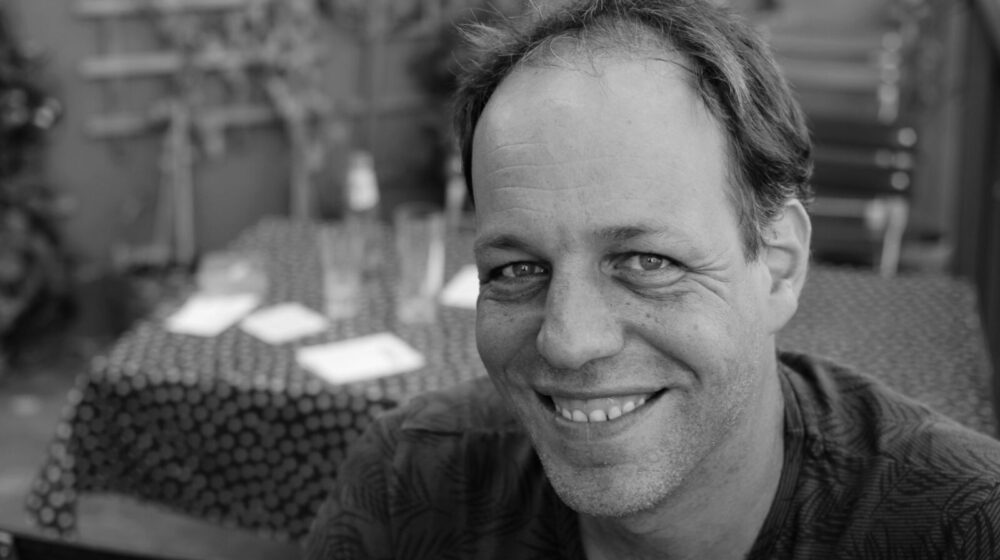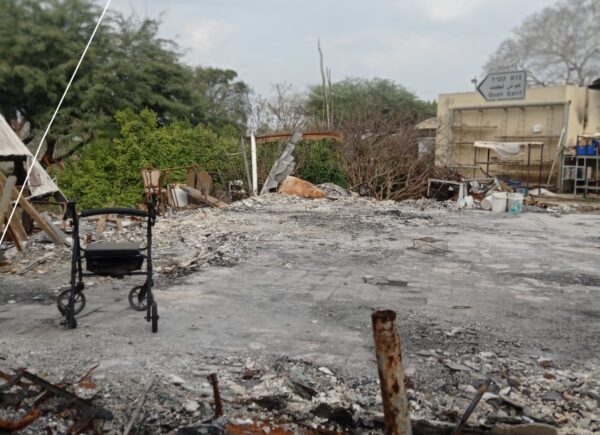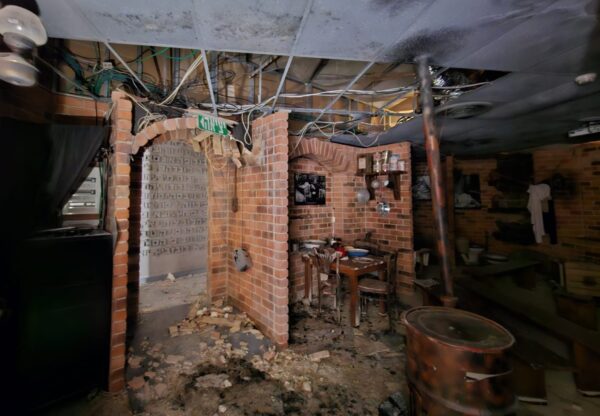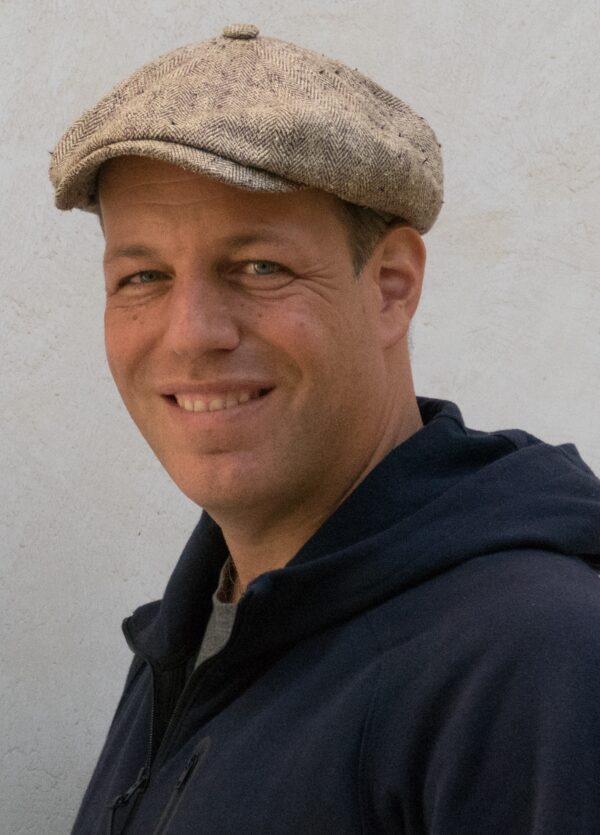No security: Historian Uriel Kashi reports from Israel

What impact will the war in Israel have on remembrance there? How do Israeli historians view the events that have unfolded since the Hamas attack? What are our counterparts in Israel who are involved in historical education and remembrance doing now? We have been talking to Uriel Kashi from Jerusalem about the current situation in his home country. An expert on Jewish history and culture, he has been organizing educational tours of Israel since 2010.
Can you describe what you experienced on October 7, the day Hamas attacked Israel?
Rocket sirens woke me up at 8 o’clock in the morning. We immediately ran to our stairwell because that’s the safest place. The air raid shelter in our cellar was still locked at that time. Then we skimmed the news and soon realized that the situation was very serious and that things were going to get dangerous. I actually had an appointment with a group of German school students from Lower Saxony that day. They were already at the airport that morning and were about to fly to Israel. So I called them and told them not to get on the plane.
What happened next?
We were all in complete shock. Israel has been attacked with rockets before. It was awful, but we have a good missile defense system, and we have a lot of confidence in our armed forces. The fact that several thousand terrorists managed to storm the border and massacre civilians has shattered our sense of security. They ruthlessly murdered, kidnapped, raped, and burned men, women, children, and little babies.

Hamas terrorists murdered at least 20 residents and took a number of hostages in the Nir Oz kibbutz on the border with the Gaza Strip. Photo: Shmuel Kahn
Rockets attack Israel almost every day
What does “security” mean for Israelis?
One of the ideas behind the State of Israel was to create a safe haven for Jews. In the aftermath of the Holocaust, it was a kind of guarantee: “Nothing like this will never happen to us again.” When I say that, I’m not trying to compare October 7 with the Shoah. But for many people, the massacres and the feeling of being entirely at the mercy of other people have brought such associations to mind. In the south of the country, people had to hide in air raid shelters for up to 48 hours. They tried not to make a sound so the terrorists wouldn’t find them. Some of them could see people being murdered. That reminds us of Jewish history before the establishment of the State of Israel – a time when people were subjected to pogroms again and again.
What is people’s sense of security like now?
A full sense of security hasn’t returned yet because people still feel threatened. The army is doing everything it can to destroy Hamas terrorist infrastructure in the Gaza Strip. There’s a lot of support for this objective among the Israeli population, as rockets continue to fly into Israel from the Gaza Strip on an almost daily basis. There are also constant attacks in the north from the “Hezbollah” terrorist organization in Lebanon. We’re also very worried about the hostages. There have been a number of reports of hostages being murdered. Israel is a very small country. Everyone knows everyone else, or just about. So everyone knows someone who has either been murdered or kidnapped.
For many people, the massacres and the feeling of being entirely at the mercy of other people have brought such associations to mind. Some could see people being murdered. That reminds us of Jewish history before the establishment of the State of Israel – a time when people were subjected to pogroms again and again.
Uriel Kashi, Historian and travel guide in Israel
Different moods among the Israelis
How are people coping with this situation?
The mood is very mixed. Many Israelis are involved in voluntary work. A few days ago, 25 of us tour guides drove to the border with the Gaza Strip and helped a farmer there with the harvest. Many of his employees have been murdered or kidnapped. His Thai migrant workers have left the country. The attack has cost him millions.
Others are helping Israelis who used to live near the Gaza Strip or the border with Lebanon and had to flee. Around 150,000 people have been affected. And then there are people who have become depressed or very melancholy and find it almost impossible to leave the house. They need help too.
What impact has the war had on institutions that focus on education and remembrance of the Shoah?
The “Yad Mordechai” Holocaust Museum is located directly on the border with the Gaza Strip and was hit by a rocket. It was named after Mordechaj Anielewicz, one of the leaders of the Warsaw Ghetto Uprising. Nobody was injured, thank God, but part of the museum was destroyed.

Image of destruction: The “Yad Mordechai” Holocaust Museum was hit by a rocket. Photo: Private collection
Comparisons between October 7 and the Holocaust are a recent phenomenon. Remembrance organizations need to use their expertise and provide clarification along the following lines: “We understand the associations, but there are very clear differences. We must not confuse two different things.” During an address to the UN Security Council at the end of October, Israel’s ambassador to the UN wore a yellow star badge to underline his demands. His actions drew criticism from the Chairman of Yad Vashem, who expressed the view that it was inappropriate to wear the yellow star in the current situation. He commented that this is not the Shoah and that people now have the State of Israel with its own army to defend them.
Jewish resistance instead of eternal victim status
Is it possible to talk about the current situation and remember the Shoah in the same breath?
The question of how to tell the story of the Shoah has been discussed repeatedly here in Israel in recent decades. At times, people accused European Jews of not having done enough to defend themselves during the Holocaust, suggesting they had allowed themselves to be led “like lambs to the slaughter.” One dissenting voice against this narrative has been the Holocaust Museum, the “Ghetto Fighters’ House” in Kibbutz Akko. It tells of Jewish resistance against the Nazis. A conscious decision was made to avoid a reductive focus on Jewish victimhood, because that makes us depressed and weak.
And then as now, what people need instead is strength to look to the future and rebuild the country. The “Ghetto Fighters’ House” is now applying this same perspective to the current war. An eyewitness interview between 99-year-old Holocaust survivor Miriam Harel and a group of reservists recently took place there. The focus was on stories of Jewish heroism. Speaking to the reservists, Miriam Harel said: “Yes, we didn’t give up back then. We kept on fighting. And we must be courageous today too and defend ourselves so that we can survive.”
How do you see your future in Israel?
We have often had times of crisis. But we were always able to win our guests over with the argument that the attacks never targeted tourists. Everyone who came here was surprised. Everyday life is peaceful, the sun is shining, and the bars are full. Even if there had been an attack in Tel Aviv two or three weeks earlier. But now there is this feeling of uncertainty. Anyone who works with foreign groups is getting cancelations from groups who want to postpone their visit until next year. It will take a long time for tourists and delegations to return to Israel. However, I’m one hundred percent certain that security will be restored. I wouldn’t still be here otherwise.
What role will this attack on Israel play in future remembrance work?
An initiative has been launched in support of a place of remembrance commemorating October 7. The idea is to tell the stories of the victims who were murdered. This initiative has been well received by the population and by all the political parties. A small temporary exhibition about the massacre at the Nova music festival was opened a few days ago in Tel Aviv. I can well imagine that exhibitions like that will be places we show to tourist groups in the future. October 7 will become part of the culture of remembrance in Israel.

Uriel Kashi
…was born in Israel and grew up in Stuttgart. He studied Jewish Studies and Education in Jerusalem and Berlin and went on to work as an education officer at the Jewish Museum Berlin. In 2007, he moved back to Israel with his family, where he worked in various different areas, including teacher training at the Yad Vashem memorial (Jerusalem). In 2010, he started organizing educational trips all over Israel.

